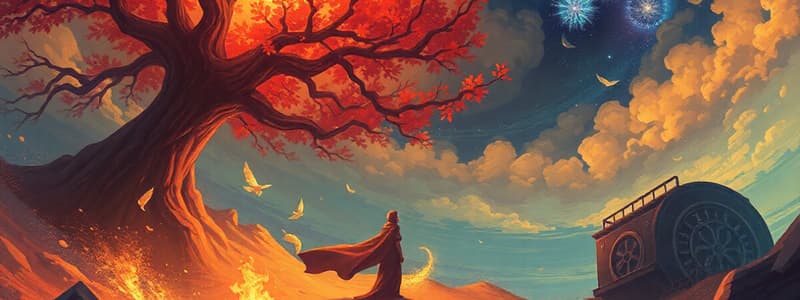Podcast
Questions and Answers
Which of the following is NOT considered a type of literature?
Which of the following is NOT considered a type of literature?
- Fiction
- Poetry
- Drama
- Mathematics (correct)
Prose is written in a poetic meter.
Prose is written in a poetic meter.
False (B)
What is the term used to describe the sequence of events in a literary work?
What is the term used to describe the sequence of events in a literary work?
Plot
The main message or idea explored in a literary work is known as the ______.
The main message or idea explored in a literary work is known as the ______.
Match the following elements of literature to their definitions:
Match the following elements of literature to their definitions:
Which approach in literary criticism focuses on the author's life and historical context?
Which approach in literary criticism focuses on the author's life and historical context?
Literary history examines the evolution of literature across different cultures and eras.
Literary history examines the evolution of literature across different cultures and eras.
What is the literary term for the perspective from which a story is told?
What is the literary term for the perspective from which a story is told?
Flashcards
What is Literature?
What is Literature?
Any written work, including novels, poems, plays, essays, short stories, and more. It encompasses a wide range of creative and imaginative expression, reflecting societal values and exploring human experiences.
What is Poetry?
What is Poetry?
A type of writing that focuses on the aesthetic and rhythmic qualities of language. It often uses figurative language like metaphors and similes to express emotions and ideas.
What is Drama?
What is Drama?
Written works intended for theatrical performance, using dialogue and instructions for actors and stage settings. They often explore human conflicts and emotions.
What is Prose?
What is Prose?
Signup and view all the flashcards
What is Fiction?
What is Fiction?
Signup and view all the flashcards
What is Non-Fiction?
What is Non-Fiction?
Signup and view all the flashcards
What is Plot?
What is Plot?
Signup and view all the flashcards
What are Characters?
What are Characters?
Signup and view all the flashcards
Study Notes
Definition and Scope
- Literature encompasses any written work, including novels, poems, plays, essays, short stories, and other forms of creative or imaginative expression.
- Literature is a broad term encompassing a wide range of styles, genres, and periods.
- Literature often explores human experiences, emotions, and ideas, reflecting society's values and beliefs.
Types of Literature
- Poetry: A form of literature utilizing aesthetic and rhythmic qualities of language; often employs figurative language to express emotions and ideas.
- Drama: Written for theatrical performance, featuring dialogue and stage directions.
- Prose: Literature written in ordinary language, unlike poetic meter; includes novels, short stories, essays, biographies, and other non-poetic forms.
- Fiction: Involves narratives imagined or invented, exploring fictional characters, settings, and events. Includes novels and short stories.
- Non-fiction: Deals with factual topics; includes biographies, historical accounts, scientific reports, and essays.
Elements of Literature
- Plot: The sequence of events in a literary work, typically involving conflict, rising action, climax, falling action, and resolution.
- Character: Individuals depicted in a literary work; characters have motivations, traits, and relationships impacting the plot.
- Setting: The time and place of the story; the setting significantly influences characters and plot.
- Theme: The central idea or message explored in a literary work, often concerning universal human experiences or issues.
- Point of View: The perspective from which the story is told (e.g., first-person, third-person limited, third-person omniscient).
- Style: The author's use of language to create meaning and effect; includes tone, diction, imagery, symbolism, and other language devices.
Literary Criticism
- Literary criticism is the analysis and interpretation of literature.
- Critics use various approaches to analyze texts, including historical, biographical, psychological, and sociological methods.
- These approaches offer varied insights into literature.
Literary History
- The development of literature across periods and cultures provides insights into social, political, and cultural contexts.
- Examining historical trends in literature reveals changes in language, style, and themes over centuries.
- Literary periods, like the Romantic or Victorian era, are associated with particular stylistic characteristics and thematic concerns.
Literary Genres
- Genres categorize and understand literary works.
- Common genres include science fiction, fantasy, romance, mystery, horror, and historical fiction.
- Genres often have specific plot, character, and setting conventions.
Impact of Literature
- Literature shapes cultural understanding and values.
- Literature stimulates discussions and encourages empathy toward diverse perspectives.
- Literature promotes critical thinking through analysis and interpretation of texts.
Studying That Suits You
Use AI to generate personalized quizzes and flashcards to suit your learning preferences.




